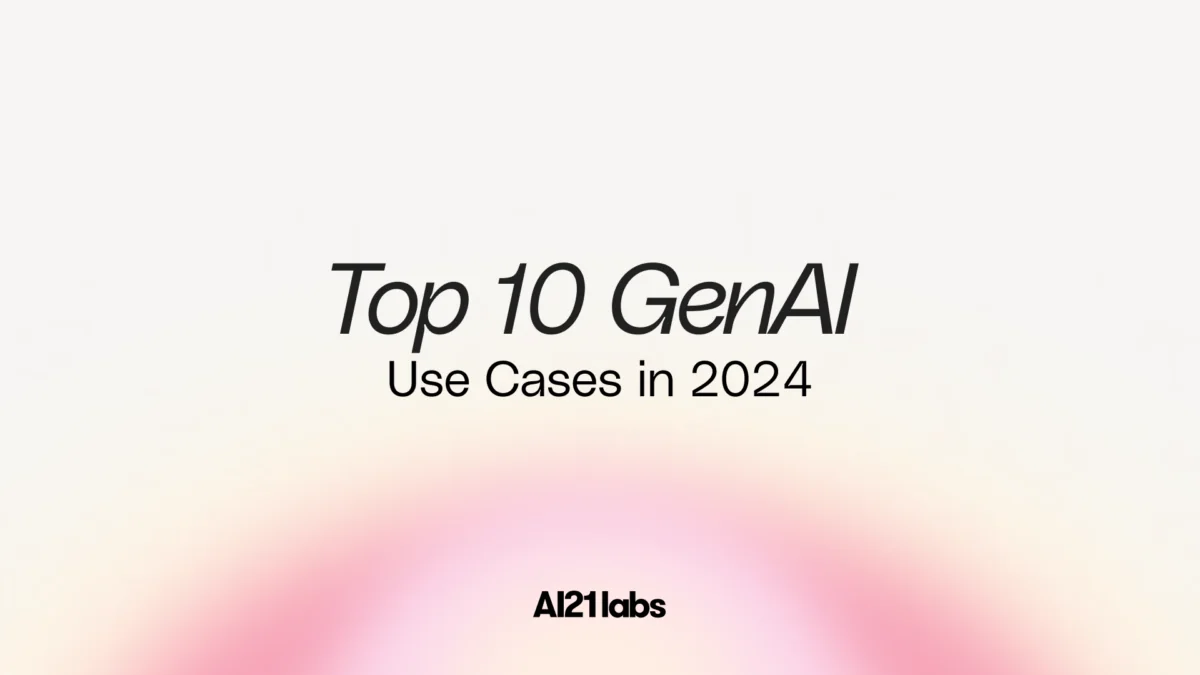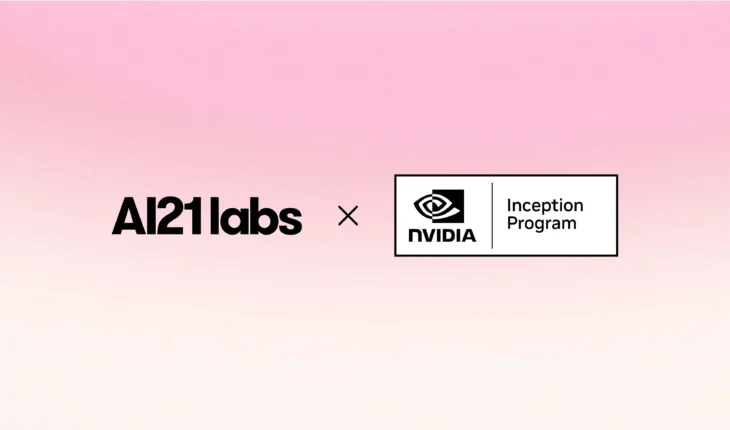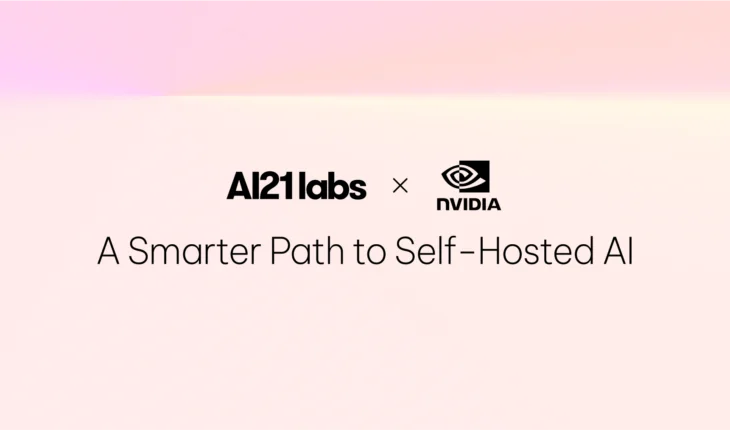Table of Contents

Top Ten GenAI Enterprise Use Cases
Generative AI is making waves across industries, promising a future brimming with creative possibilities and boosted productivity. But for many businesses, the path to implementation remains unclear. Building custom models requires significant data science expertise and multi-million dollar investments. Even utilizing pre-trained foundation models can be prohibitively complex for enterprises.
The Roadblock: Costly Training and Limited Expertise
Training a custom, all-encompassing enterprise AI model is a mammoth undertaking. It requires a hefty investment, specialized skills, and a mountain of data. This reality often leaves businesses feeling shut out from the generative AI revolution.
Recent surveys reveal staggering adoption barriers – less than half of major US corporations have the proper technology, talent and governance to implement AI. The result is a painful gap between AI interest and activation.
This gap highlights the need for ready-made solutions that allow enterprises across all industries to deploy generative AI seamlessly. Enter Task-Specific Models (TSMs), the champions of practicality that can unlock real value for your organization, today.
The Solution: Task-Specific Models – Focused Power at a Fraction of the Cost
Task-Specific Models (TSMs) are the perfect entry point for enterprise AI. These models are specialized derivatives of large language models (LLMs), developed and trained to excel at a particular natural language capability, like question answering or text summarization. These are like the “Swiss Army Knives” of Generative AI, designed to tackle specific enterprise challenges with laser focus.
This streamlined approach offers several advantages:
- Out-of-the-box value – Get started quickly with packaged solutions, and use flexible outputs that integrate seamlessly into your workflow.
- Cost-Effectiveness – Smaller models mean lower cost of ownership, while still guaranteeing exceptional, task-specific output.
- Higher Accuracy – Grounded, robust outputs within defined guardrails you can trust, minimizing costly errors and hallucinations.
- Lower Latency – Smaller footprint means faster response times, keeping your applications agile and efficient.
The future of AI is specialized
Now, let’s see how Task-Specific Models can be put to work in your organization:
Contextual Answers: Focused Q&A for Business
Generative AI excels at creating vast amounts of content, but for enterprises, the focus is on getting accurate answers to specific questions. AI21’s Contextual Answers TSM bridges this gap by harnessing the power of Generative AI alongside your organization’s unique data and context.
Here’s how Contextual Answers empowers businesses:
- Trustworthy Answers – Documents like policy manuals, FAQs, and knowledge base articles are uploaded to the model. This ensures answers are firmly grounded in verified information, eliminating concerns about unreliable sources or “hallucinations” often associated with generative models.
- Transparency and Control – Since the source material is readily identifiable, organizations can provide clear references alongside AI-generated answers. This transparency fosters trust among users and facilitates wider adoption of the system.
Use Case #1: Boosting Customer Service with Conversational AI
Imagine an AI-powered chatbot handling a significant portion of customer inquiries. Contextual Answers makes this a reality for B2C organizations. Here’s how it streamlines customer service:
- Reduced Costs and Increased Efficiency – The model deflects a high volume of basic questions, freeing up human support staff for complex issues. This translates to significant cost savings and improved efficiency.
- 24/7 Availability and Consistent Responses – Customers receive prompt and consistent answers anytime, enhancing the overall customer experience.
- Personalized Interactions – Contextual Answers can be anonymized and equipped with complexity indicators. This allows the model to handle simpler issues while flagging more intricate cases that require human intervention.
Use Case #2: Automating Repetitive Helpdesk Tasks
Helpdesks often grapple with repetitive tasks, draining staff morale and productivity. Contextual Answers paired with AI21’s Semantic Search TSM offers a powerful solution:
- Identifying Repetitive Tickets – The model analyzes customer queries, readily identifying common issues and repetitive tickets.
- Efficient Responses Based on Internal Knowledge – Once a request is understood, Contextual Answers leverages your organization’s internal documents to craft an appropriate response. The phrasing itself is drawn from these documents, ensuring clear and relevant communication.
Use Case #3: Boost Due Diligence Efficiency
Uncover critical insights faster with AI-powered multi-document question answering. Leverage RAG technology to analyze vast amounts of data with exceptional accuracy.
- Analyze vast amounts of data from internal documents and financial research.
- Minimize human error and ensure factual accuracy in information gathering.
- Expedite investment decisions by delegating information retrieval to AI, saving time and resources.
By harnessing the power of Contextual Answers, businesses can achieve a more efficient, cost-effective, and customer-centric approach to communication.
Use Case #4: Optimizing Product Development
Customer feedback and product usage data are often difficult to find during the design and development process. Contextual Answers can be integrated with customer support databases, product reviews, and user surveys to extract insights and identify customer needs.
- Surfacing Hidden Insights – Contextual Answers can highlight recurring issues and user frustrations buried within customer feedback, ensuring products address real user needs.
- Facilitating Data-Driven Decisions – Easier access to actionable insights enables data-driven product decisions, leading to faster iterations and shorter development cycles.
- Enhancing Product-Market Fit – With a deeper understanding of customer needs, products can be designed to better resonate with the target market, increasing the likelihood of success.
Summarization: Turning Information Overload into Actionable Insights
The ever-growing mountain of data facing businesses can be overwhelming. AI21’s Summarization model tackles this challenge by leveraging Generative AI to condense and analyze vast amounts of text.
Here’s how it empowers organizations:
- Enhanced Customer Experience – New customers can get up-to-speed faster by accessing clear summaries of key documents, streamlining onboarding and support processes.
- Improved Customer Understanding – Summarize customer feedback, including emails, reviews, and complaints, to identify recurring themes and pain points. This allows businesses to address customer concerns more effectively.
- Increased Staff Productivity – Empower your team to quickly review large volumes of documents. Summarization automates the process of extracting key information, saving valuable time for analysis and decision-making.
Use Case #5: Compliance Made Easier
Regulatory compliance in industries like finance often involves meticulously monitoring a vast amount of documentation. AI21’s Summarization TSM can be trained on specific regulations and terminology. It then scans communications and documents, summarizing them to highlight critical information and potential compliance risks. This allows for faster and more efficient compliance reviews.
Use Case #6: Accelerated Research & Development
Extracting valuable insights from pharmacological databases and research papers can be a time-consuming process. The Summarization TSM tackles this challenge by summarizing complex documents at scale. Researchers can quickly identify the most relevant papers, saving them valuable time for in-depth analysis and leading to faster scientific breakthroughs.
Use Case #7: Streamlined Contract Review
Extracting key information from contracts is a tedious task, often handled by legal teams, sales professionals, and HR departments. The Summarization TSM automates this process by identifying and summarizing key points within contracts, flagging noteworthy documents, and even populating forms with relevant excerpts. This frees up valuable human resources for more strategic tasks.
Use Case #8: Clearer Business Communication
Legal documents are notorious for their complex language. The Summarization TSM, working in conjunction with AI21’s Text Editing TSM, can simplify these documents by summarizing and paraphrasing key points. This allows stakeholders from different departments to understand the legal implications and provide informed feedback. This results in dramatically faster response times, which in turn can make the difference between deals won and lost.
By transforming information overload into actionable insights, AI21’s Summarization TSM empowers businesses to streamline operations, improve customer experiences, and make data-driven decisions faster.
Semantic Search: Unveiling the Hidden Meaning in Your Search
Imagine a search engine that understands not just your keywords, but the true intent behind your query. This is the power of Semantic Search, and AI21’s Semantic Search TSM unlocks this potential for businesses.
Traditional search engines rely on keyword matching, often delivering frustratingly irrelevant results. Semantic Search goes deeper, leveraging Generative AI to understand the meaning behind a search. This means:
- Enhanced Customer Experience – Customers get highly relevant results that match the context, not just the literal words used in their search. This translates to a more positive user experience and faster discovery of the information they need.
- Improved Employee Productivity – Employees can easily find the information they need, even if they don’t know the exact keywords to use. This can save valuable time and boost overall productivity.
AI21’s Semantic Search TSM utilizes your organization’s uploaded documents, ensuring retrieved information is relevant and reliable. Since you own the data, copyright concerns are eliminated, and any questions about results can be easily addressed.
The model continuously learns and improves as users interact with it. By analyzing user behavior, the system refines its understanding of contextual relevance in relation to specific subject matters.
Use Case #9: Personalized Content Recommendations
Marketing teams can utilize Semantic Search to understand user intent behind content searches. This allows them to deliver targeted content that aligns with each user’s stage in the buying journey, level of knowledge, and specific needs. This personalized approach can significantly improve conversion rates.
Use Case #10: Conversational Knowledge Management
Imagine a system where employees can access a wealth of organizational knowledge through natural language questions. AI21’s Semantic Search TSM, working alongside Contextual Answers TSM, creates a knowledge base that allows employees to tap into a treasure trove of documents – like customer communications, meeting minutes, or due diligence information – just by asking a question. This empowers a collaborative and informed workforce.
By unlocking the true meaning behind searches, AI21’s Semantic Search TSM empowers businesses to deliver exceptional customer experiences, improve employee productivity, and leverage the power of their internal data.
Turn potential into value
While generative AI offers immense potential, expensive custom models have been a barrier for many enterprises. Task-Specific Models (TSMs) offer a powerful and accessible alternative. These focused AI solutions tackle specific tasks like question answering, summarization, and search, delivering significant value without the hefty price tag or complex development process. TSMs empower businesses to streamline operations, unlock data insights, and make data-driven decisions faster, propelling them towards a competitive edge in the era of generative AI.
Speak to our experts to scope high-value AI applications – our team’s extensive deployment experience can help you optimize genAI for real-world implementation.


